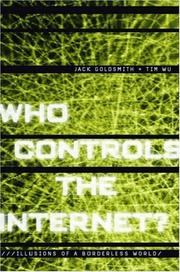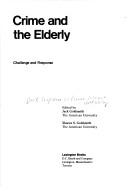| Listing 1 - 10 of 15 | << page >> |
Sort by
|
Book
ISBN: 9780393081336 0393081338 Year: 2012 Publisher: New York, N.Y. Norton
Abstract | Keywords | Export | Availability | Bookmark
 Loading...
Loading...Choose an application
- Reference Manager
- EndNote
- RefWorks (Direct export to RefWorks)
Theory of the state --- Political sociology --- United States --- Presidents --- Executive power --- Separation of powers --- History --- Presidents - United States - History - 21st century --- Executive power - United States - History - 21st century --- Separation of powers - United States - History - 21st century --- United States of America
Book
ISBN: 019760112X 0197601812 0197601820 9780197601792 9780197601129 9780197601815 9780197601808 0197601790 0197601804 Year: 2022 Publisher: Oxford University Press
Abstract | Keywords | Export | Availability | Bookmark
 Loading...
Loading...Choose an application
- Reference Manager
- EndNote
- RefWorks (Direct export to RefWorks)
In the 2010s, America's adversaries conducted numerous damaging cyber operations inside the United States: the Office of Personnel Management breach, attacks on banks, persistent intellectual property theft by China, and the Russian intervention in the 2016 election. The US--possessor of the world's most powerful cyber arsenal--responded in 2018 by unveiling a new Defend Forward strategy. It is a large step in the direction of more aggressive action in cyberspace--albeit for defensive ends. The US has not attempted to hide this shift. To the contrary, it has telegraphed the change. But the telegraphing has taken place at a highly abstract level. Very little is known about precisely what types of operations Defend Forward entails. While the US government has asserted that Defend Forward is consistent with domestic and international law, it has not explained how the new strategy overcomes the perceived legal constraints that previously tempered US responses to cyber intrusions andthreats. This volume, edited by Jack Goldsmith and featuring a cast of leading scholars in the field, provides an authoritative overview of the origins and operation of Defend Forward, and a comprehensive assessment of its legality. For anyone interested in the future of great power conflict and the cyber strategies that the US is deploying against its adversaries, The United States' Defend Forward Cyber Strategy is an essential read.
Computer security --- Cyberinfrastructure --- Law and legislation --- Government policy --- Security measures --- Cyber-based information systems --- Cyber-infrastructure --- Electronic data processing --- Information technology --- Computer networks --- Computer systems --- Distributed databases --- High performance computing --- Distributed processing --- Computer privacy --- Computer system security --- Computers --- Cyber security --- Cybersecurity --- Electronic digital computers --- Protection of computer systems --- Security of computer systems --- Data protection --- Security systems --- Hacking --- Protection --- Law
Book
ISBN: 094132074X Year: 1997 Publisher: Dobbs Ferry Transnational publ.
Abstract | Keywords | Export | Availability | Bookmark
 Loading...
Loading...Choose an application
- Reference Manager
- EndNote
- RefWorks (Direct export to RefWorks)
Conflict of laws --- Forum non conveniens --- 341.522 --- Md1.e --- Inconvenient forum --- Jurisdiction --- Transfer of cause --- Choice of law --- Intermunicipal law --- International law, Private --- International private law --- Private international law --- Law --- Legal polycentricity --- Jurisdiction&delete& --- Congresses --- Civil law --- Law of civil procedure

ISBN: 0195152662 9780195152661 Year: 2006 Publisher: New York : Oxford University Press,
Abstract | Keywords | Export | Availability | Bookmark
 Loading...
Loading...Choose an application
- Reference Manager
- EndNote
- RefWorks (Direct export to RefWorks)
Will cyberanarchy rule the net? And if we do find a way to regulate our cyberlife will national borders dissolve as the Internet becomes the first global state? In this provocative new work, Jack L. Goldsmith and Tim Wu dismiss the fashionable talk of both a 'borderless' net and of a single governing 'code'. Territorial governments can and will, they contend, exercise significant control over all aspects of Internet communications. Examining policy puzzles from e-commerce to privacy, speech and pornography, intellectual property, and cybercrime, Who Controls the Internet demonstrates that individual governments rather than private or global bodies will play that dominant role in regulation. Accessible and controversial, this work is bound to stir comment.
Internet --- Social aspects --- Government policy --- Law and legislation --- Geografie --- Government policy. --- Law and legislation. --- Social aspects. --- Economische geografie --- Wereldeconomie Globalisering. --- internet --- overheidscommunicatie --- sociale controle --- Computer architecture. Operating systems --- Political sociology --- 303.4833 --- Qb7.2 --- Cyberspace --- DARPA Internet --- Internet (Computer network) --- Wide area networks (Computer networks) --- World Wide Web --- Aspect social --- Politique gouvernementale --- Droit --- Internet - Social aspects --- Internet - Government policy --- Internet - Law and legislation

ISBN: 0669005614 Year: 1976 Publisher: Lexington Heath
Abstract | Keywords | Export | Availability | Bookmark
 Loading...
Loading...Choose an application
- Reference Manager
- EndNote
- RefWorks (Direct export to RefWorks)
343.9 --- Aged --- -Aged --- Aging people --- Elderly people --- Old people --- Older adults --- Older persons --- Senior citizens --- Seniors (Older people) --- Age groups --- Persons --- Gerontocracy --- Gerontology --- Old age --- 343.9 Criminologie --(algemeen) --- Criminologie --(algemeen) --- Crimes against --- -Congresses --- Older people

ISBN: 9780195340648 0195340647 9780195152661 Year: 2008 Publisher: Oxford : Oxford university press,
Abstract | Keywords | Export | Availability | Bookmark
 Loading...
Loading...Choose an application
- Reference Manager
- EndNote
- RefWorks (Direct export to RefWorks)
Is the Internet erasing national borders? Will the future of the Net be set by Internet engineers, rogue programmers, the United Nations, or powerful countries? Who's really in control of what's happening on the Net? In this provocative new book, Jack Goldsmith and Tim Wu tell the fascinating story of the Internet's challenge to governmental rule in the 1990s, and the ensuing battles with governments around the world. It's a book about the fate of one idea--that the Internet might liberate us forever from government, borders, and even our physical selves. We learn of Google's struggles with the French government and Yahoo's capitulation to the Chinese regime; of how the European Union sets privacy standards on the Net for the entire world; and of eBay's struggles with fraud and how it slowly learned to trust the FBI. In a decade of events the original vision is uprooted, as governments time and time again assert their power to direct the future of the Internet. The destiny of the Internet over the next decades, argue Goldsmith and Wu, will reflect the interests of powerful nations and the conflicts within and between them. While acknowledging the many attractions of the earliest visions of the Internet, the authors describe the new order, and speaking to both its surprising virtues and unavoidable vices. Far from destroying the Internet, the experience of the last decade has lead to a quiet rediscovery of some of the oldest functions and justifications for territorial government. While territorial governments have unavoidable problems, it has proven hard to replace what legitimacy governments have, and harder yet to replace the system of rule of law that controls the unchecked evils of anarchy. While the Net will change some of the ways that territorial states govern, it will not diminish the oldest and most fundamental roles of government and challenges of governance. Well written and filled with fascinating examples, including colorful portraits of many key players in Internet history, this is a work that is bound to stir heated debate in the cyberspace community.
Internet --- Social aspects --- Government policy --- Law and legislation --- Internet - Social aspects --- Internet - Government policy --- Internet - Law and legislation --- Société. --- Politique publique. --- Législation.

ISBN: 019756190X 1280532475 0198034806 1429404043 9780198034803 9780195152661 0195152662 9781280532474 9781429404044 0199839662 9780197561904 Year: 2006 Publisher: New York : Oxford University Press,
Abstract | Keywords | Export | Availability | Bookmark
 Loading...
Loading...Choose an application
- Reference Manager
- EndNote
- RefWorks (Direct export to RefWorks)
Examining issues from e-commerce to privacy and pornography, intellectual property rights, and cybercrime, 'Who Controls the Internet' demonstrates that individual governments, rather than private or global bodies will play the dominant role in regulation.
Internet --- Cyberspace --- DARPA Internet --- Internet (Computer network) --- Wide area networks (Computer networks) --- World Wide Web --- Social aspects. --- Government policy. --- Law and legislation. --- Law and legislation
Book
ISBN: 0913530018 Year: 1974 Publisher: Pacific Palisades Palisades publ.
Abstract | Keywords | Export | Availability | Bookmark
 Loading...
Loading...Choose an application
- Reference Manager
- EndNote
- RefWorks (Direct export to RefWorks)
Book
Year: 1976 Publisher: Lexington-Toronto Lexington Books
Abstract | Keywords | Export | Availability | Bookmark
 Loading...
Loading...Choose an application
- Reference Manager
- EndNote
- RefWorks (Direct export to RefWorks)

ISBN: 0691113610 0691113602 9786612665745 1400826640 128266574X 9781400826643 9780691113609 9780691113616 Year: 2005 Publisher: Princeton, N.J. : Princeton University Press,
Abstract | Keywords | Export | Availability | Bookmark
 Loading...
Loading...Choose an application
- Reference Manager
- EndNote
- RefWorks (Direct export to RefWorks)
George Orwell's Nineteen Eighty-Four is among the most widely read books in the world. For more than 50 years, it has been regarded as a morality tale for the possible future of modern society, a future involving nothing less than extinction of humanity itself. Does Nineteen Eighty-Four remain relevant in our new century? The editors of this book assembled a distinguished group of philosophers, literary specialists, political commentators, historians, and lawyers and asked them to take a wide-ranging and uninhibited look at that question. The editors deliberately avoided Orwell scholars in an effort to call forth a fresh and diverse range of responses to the major work of one of the most durable literary figures among twentieth-century English writers. As Nineteen Eighty-Four protagonist Winston Smith has admirers on the right, in the center, and on the left, the contributors similarly represent a wide range of political, literary, and moral viewpoints. The Cold War that has so often been linked to Orwell's novel ended with more of a whimper than a bang, but most of the issues of concern to him remain alive in some form today: censorship, scientific surveillance, power worship, the autonomy of art, the meaning of democracy, relations between men and women, and many others. The contributors bring a variety of insightful and contemporary perspectives to bear on these questions.
Orwell, George --- Dys-utopies dans la littérature --- Dystopias in literature --- Dysutopieën in de literatuur --- 820 "19" ORWELL, GEORGE --- Engelse literatuur--20e eeuw. Periode 1900-1999--ORWELL, GEORGE --- Dystopias in literature. --- Science fiction, English --- History and criticism. --- Orwell, George, --- 820 "19" ORWELL, GEORGE Engelse literatuur--20e eeuw. Periode 1900-1999--ORWELL, GEORGE --- History and criticism --- Science fiction [English ]
| Listing 1 - 10 of 15 | << page >> |
Sort by
|

 Search
Search Feedback
Feedback About
About Help
Help News
News